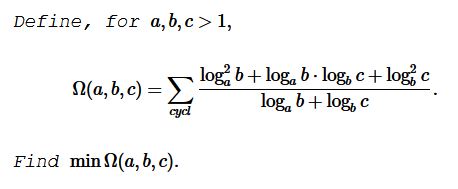Minimum of a Cyclic Sum with Logarithms
Problem

Solution 1
Let $\log_ab=x,\,$ $\log_bc=y,\,$ $\log_ca=z.\,$ Clearly $xyz=1.\,$ In terms of $x,y,z,\,$ the function becomes, say,
$\displaystyle\begin{align} \Omega(a,b,c)=\Omega'(x,y,z)&=\sum_{cycl}\frac{x^2+xy+y^2}{x+y}\\ &=\sum_{cycl}\frac{(x+y)^2-xy}{x+y}\\ &=2(x+y+z)-\left(\frac{xy}{x+y}+\frac{yz}{y+z}+\frac{zx}{z+x}\right). \end{align}$
Now, by the AM-HM inequality, $\displaystyle -\frac{xy}{x+y}\ge -\frac{x+y}{2},\,$ such that
$\displaystyle\begin{align} \Omega'(x,y,z)&=2(x+y+z)-\left(\frac{xy}{x+y}+\frac{yz}{y+z}+\frac{zx}{z+x}\right)\\ &\ge 2(x+y+z)-\frac{2}{4}(x+y+z)=\frac{3}{2}(x+y+z)\\ &\ge\frac{9}{2}\sqrt[3]{xyz}=\frac{9}{2}. \end{align}$
Since equality is attained for $x=y=z=1,\,$ $\min\Omega'(x,y,z)=\displaystyle \frac{9}{2},\,$ implying $\min\Omega(a,b,c)=\displaystyle \frac{9}{2},\,$ attained for $a=b=c.$
Solution 2
With the same notation as in Solution 1, and using the AM-GM inequality,
$\displaystyle\begin{align} \sum_{cycl}\frac{x^2+xy+y^2}{x+y}&\ge\sum_{cycl}\frac{3(x+y)^2}{4(x+y)}\\ &=\sum_{cycl}\frac{3}{4}(x+y)=\frac{3}{2}(x+y+z)\\ &\ge\frac{9}{2}\sqrt[3]{xyz}=\frac{9}{2}. \end{align}$
Equality occurs for $x=y=z=1.$
Solution 3
We expand $\displaystyle \Omega(a,b,c)=\sum_{cycl}\frac{\displaystyle \frac{\log^2a}{\log^2b}+\frac{\log c}{\log a}+\frac{\log^2c}{\log^2b}}{\displaystyle \frac{\log b}{\log a}+\frac{\log c}{\log b}}.$
Now let $x=log a,\,$ $y=\log b,\,$ $z=\log c.\,$ The function transforms to
$\displaystyle\begin{align}\Omega_2(x,y,z)&=\sum_{cycl}\frac{\displaystyle \frac{y^2}{x^2}+\frac{x^2}{z^2}+\frac{y}{x}}{\displaystyle \frac{y}{x}+\frac{x}{z}}\\ \frac{x^4+y^2z^2+x^yz}{x^3z+xyz^2} \end{align}$
By the AM-GM inequality,
$\displaystyle \begin{align} \sum_{cycl}\frac{x^4+y^2z^2+x^yz}{x^3z+xyz^2}&\ge 3\sqrt[3]{\prod_{cycl}\frac{x^4+x^2yz+y^2z^2}{x^4+x^2yz}}. \end{align}$
Now, using $\displaystyle x^4+x^2yz+y^2z^2\ge\frac{3}{4}(x^2+yz)^2,$
$\displaystyle \begin{align} 3\sqrt[3]{\prod_{cycl}\frac{x^4+x^2yz+y^2z^2}{x^4+x^2yz}}&\ge 3\sqrt[3]{\prod_{cycl}\frac{3}{4}\cdot\frac{(x^2+yz)^2}{x^4+x^2yz}}\\ &=\frac{9}{4}\cdot\frac{\displaystyle (y^2+xz)^{\frac{1}{3}}(x^2+zy)^{\frac{1}{3}}(z^2+xy)^{\frac{1}{3}}}{\displaystyle x^{\frac{2}{3}}y^{\frac{2}{3}}z^{\frac{2}{3}}}. \end{align}$
Now, with the AM-GM inequality,
$\displaystyle \begin{align} \frac{9}{4}\cdot\frac{\displaystyle (y^2+xz)^{\frac{1}{3}}(x^2+zy)^{\frac{1}{3}}(z^2+xy)^{\frac{1}{3}}}{\displaystyle x^{\frac{2}{3}}y^{\frac{2}{3}}z^{\frac{2}{3}}}&\ge \frac{9}{4}\cdot\frac{\displaystyle (2\sqrt{y^2xz})^{\frac{1}{3}}(2\sqrt{x^2zy})^{\frac{1}{3}}(2\sqrt{z^2xy})^{\frac{1}{3}}}{\displaystyle x^{\frac{2}{3}}y^{\frac{2}{3}}z^{\frac{2}{3}}}\\ &=\frac{9}{4}\cdot\frac{\displaystyle 2\cdot x^{\frac{2}{3}}y^{\frac{2}{3}}z^{\frac{2}{3}}}{\displaystyle x^{\frac{2}{3}}y^{\frac{2}{3}}z^{\frac{2}{3}}}\\ &=\frac{9}{2}. \end{align}$
Acknowledgment
Dan Sitaru has kindly posted a problem of his from the Romanian Mathematical Magazine at the CutTheKnotMath facebook page. Solution 1 is by Subhajit Chattopadhyay and, independently, by Geanina Tudose; Solution 2 is by Kevin Soto Palacios; Solution 3 is by N. N. Taleb.
![]()
|Contact| |Front page| |Contents| |Algebra|
Copyright © 1996-2018 Alexander Bogomolny73735810
